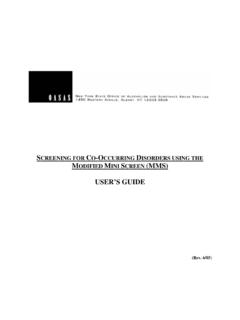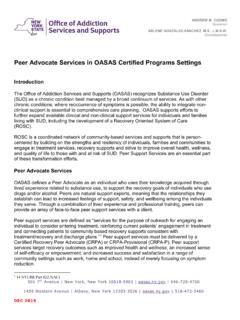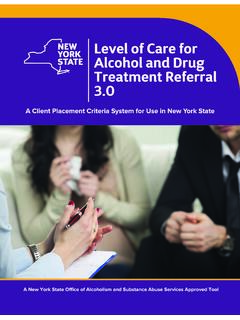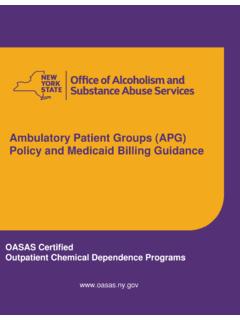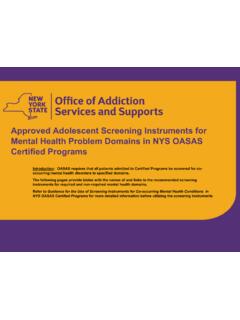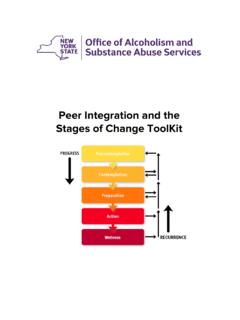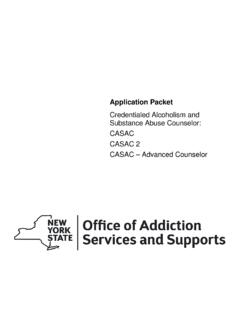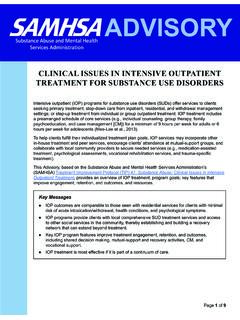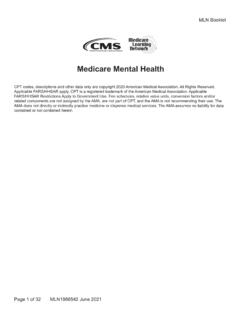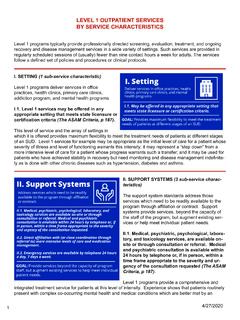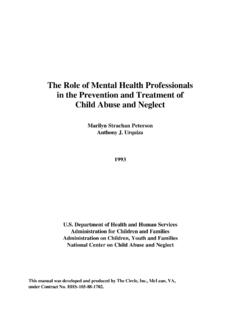Transcription of AMENDED PART 822 EFFECTIVE AUGUST 2, 2021: PART 822 ...
1 AMENDED PART 822 EFFECTIVE AUGUST 2, 2021: PART 822. GENERAL SERVICE STANDARDS FOR SUBSTANCE USE DISORDER. outpatient PROGRAMS. [Statutory Authority: Mental Hygiene Law Sections (c), (e), (b), , (b), (d), , , (b), (a) (b), (c); Penal Law Section ; Public Health Law Section 3309, 2781; 42 CFR Part 8]. Section: Background Legal base Applicability Savings and renewal clause Definitions Standards pertaining to Medicaid reimbursement General program standards Patient records/ treatment planning Additional locations Additional requirements for substance use disorder outpatient rehabilitation services Additional requirements for opioid treatment programs Severability Background This Part contains requirements applicable to substance use disorder (SUD) outpatient programs certified, licensed, funded or otherwise authorized by the Office and the services provided by such programs. For purposes of this Part, addiction or substance use disorder is a chronic illness that can be treated effectively with counseling, approved medications used consistent with their pharmacological efficacy, and supportive services such as treatment for co-occurring disorders, medical and psychiatric services, vocational rehabilitation and family intervention and support.
2 Legal base (a) Section (c) of the Mental Hygiene Law (MHL) charges the Office with the responsibility to ensure that persons who have a substance use disorder and their families are provided with care and treatment that is EFFECTIVE and of high quality. 1. (b) Section (e) of the MHL authorizes the commissioner to adopt standards including necessary rules and regulations pertaining to substance use disorder treatment services. (c) Section (b) of the MHL authorizes the commissioner to adopt regulations necessary and proper to implement any matter under their jurisdiction. (d) Section of the MHL requires the commissioner to establish and maintain, either directly or through contract, a central registry for purposes of preventing multiple enrollments in opioid treatment programs and provides medication dosage information during an emergency, when displaced patients may seek such treatment from an alternate program. (e) Section (b) of the MHL requires the commissioner to establish and enforce regulations concerning the licensing, certification, and inspection of substance use disorder treatment services.
3 (f) Section (d) of the MHL requires the Office to establish reasonable performance standards for providers of services certified by the Office. (g) Section of the MHL authorizes the commissioner to issue operating certificates for the provision of substance use disorder treatment services. (h) Section (c) of the Mental Hygiene Law authorizes the commissioner to promulgate rules and regulations to ensure that the rights of individuals who have received, and are receiving, substance use disorder services are protected. (i) Section of the MHL authorizes the commissioner to adopt any regulation reasonably necessary to implement and effectively exercise the powers and perform the duties conferred by Article 32 of the MHL. (j) Section (b) of the MHL provides that a controlled substance designated by the commissioner of the New York State Department of Health (DOH) as appropriate for such use may be used by a prescribing professional to treat an individual with a substance use disorder pursuant to section (b) of the MHL.
4 (k) Section (a) of the MHL authorizes the commissioner to adopt regulations to effectuate the provisions and purposes of Article 32 of the MHL. (l) Section (b) of the MHL provides that the commissioner may, once a controlled substance is approved by the commissioner of DOH as appropriate for such use, authorize the use of such controlled substance in treating an individual with a substance use disorder. 2. (m) Section of the Penal Law affords limited protections from prosecution for persons seeking medical attention for accidental overdose. (n) Section 3309 of the Public Health Law authorizes the DOH to establish standards for approval of any opioid overdose prevention program. (o) Section 2781 of the Public Health Law defines the rules governing HIV testing in New York. (p) 42 CFR Part 8 relates to the federal oversight and regulation of medication assisted treatment for opioid use disorders. Applicability (a) Part 822 applies to any person or entity organized in accordance with this Part, operating pursuant to the provisions of this Title and certified, funded or otherwise authorized by the Office to operate an outpatient treatment program.
5 Except as indicated in subdivision (b) of this section, to provide services pursuant to this Part, each provider must obtain and maintain an operating certificate pursuant to Part 810 of this Title. Programs providing opioid full agonist treatment medications must additionally obtain approval from a federally-approved accrediting body, and all other applicable regulatory entities. (b) The provision of treatment services within local correctional facilities shall not require certification by the Office; however, local correctional facilities must follow any other applicable state and federal regulations. The Office reserves the right to review protocols, delivery of services and discharge planning procedures of programs providing medications for substance use disorders within local correctional facilities. Savings and renewal clause Any operating certificate issued by the Office prior to the promulgation of this Part for the operation of a program subject to regulations of the former Part 822 shall remain in effect until the term of such operating certificate has been renewed or such operating certificate is suspended or revoked through process of law, at which time any recertification of such program or renewal of such operating certificate shall be pursuant to the provisions of this Part.
6 Definitions 3. As used in this Part, unless otherwise indicated, the following terms shall be applicable all programs providing outpatient services: (a) Accrediting Body means an entity approved by the federal Substance Abuse Mental Health Services Administration (SAMHSA) to accredit all programs pursuant to 42 CFR Part through using opioid full agonist treatment medications. (b) Active treatment is the period from pre-admission through discharge. (c) Admission assessment is a service between a prospective patient and clinical staff for the purpose of determining a preliminary diagnosis, appropriateness for service, person-centered initial plan of treatment , including type(s) of services and frequency of services. (d) Ancillary withdrawal is a service whereby patients in mild to moderate or persistent withdrawal receive symptom relief and/or addiction medications after an assessment of the level of withdrawal determined using a standardized assessment instrument. Providers must receive Office approved designation to provide this service.
7 (e) Approved medications means any medication approved by state or federal authorities for the treatment of substance use disorder. (f) Brief intervention is a service between a prospective patient and clinical staff when screening results indicate at risk behavior. The brief intervention educates patients about their substance use, alerts them to possible consequences, and is intended to encourage healthier choices. (g) Brief treatment is a service between an active patient and clinical staff and must include a target behavior or health need and an evidence-based or clinical practice upon which the treatment is based. Brief treatment may be used throughout the course of treatment to meet specific goals, motivate patients or support medicated supported recovery. (h) Central registry system means the central registry established and maintained by the Office pursuant to section of the Mental Hygiene Law. (i) Collateral person is a member of a patient's family or household, significant others, or persons who are directly affected by regular interaction with the patient, or who have the capability to affect both the patient's substance use disorder and recovery.
8 (j) Collateral visit is a service between a clinical staff member and a collateral person for the purpose of providing an intervention in the service of the primary patient's progress in treatment . 4. (k) Complex care coordination is an ancillary service provided to a patient when a critical event occurs, or the individual's condition requires significant coordination with other service providers. Complex care coordination is distinguished from routine case coordination activities. (l) Continuing care treatment is a treatment protocol that offers clinical support for the ongoing disease management needs of patients. Patients have either completed the goals of active treatment and are discharged with referral to continuing care or opt for continuing care any time after discharge. (m) Group counseling is a service between one or more clinical staff and multiple patients at the same time, to be delivered consistent with patient treatment /recovery plans, their development or emergent issues.
9 Group counseling sessions must be structured in size and duration to maximize therapeutic benefit for each participant. Program policies must include a process for determining group size, group purpose, monitoring patient experience, and assessing group efficacy. (n) Individual counseling is a service between a clinical staff member and a patient focused on the needs and goals of the patient to be delivered consistent with the treatment /recovery plan, its development or emergent issues. (o) Initial services or pre-admission services are services prior to admission as the first step in developing a treatment /recovery plan, focusing on issues that need to be addressed to ensure successful engagement and admission into treatment and any other urgent or emergent issues. Initial/pre-admission services address priority goals based on presenting problem(s) identified during the patient's assessment and provide focus for the critical period of treatment engagement. Services which may be delivered preadmission will be identified by the Office.
10 (p) intensive outpatient services (IOS) is an outpatient treatment service provided by a team of clinical staff for patients who require a time-limited, multi-faceted array of services, structure, and support to achieve and sustain recovery. Programs that offer intensive outpatient treatment must make available individual and group counseling, family counseling when appropriate, skills to mitigate reoccurrence, and coping skills training, including as appropriate, Dialectical and Behavioral Therapy (DBT), Motivational Enhancement Therapy (MET), Cognitive Behavioral Therapy (CBT) and increased connections to recovery supports and other evidence based practices as proven EFFECTIVE in meeting patient needs. 5. (q) Medication administration and observation is face-to-face administration or dispensing of a medication by medical staff, to be delivered in conjunction with observation of the patient prior to the administration and after, as appropriate to the medication and patient's condition.

